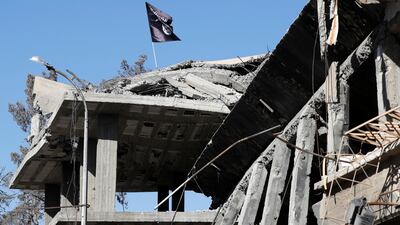The fall of Raqqa has, not surprisingly, been greeted with scenes of great jubilation by all those forces, particularly the Kurds and the Syrian Democratic Forces, that have participated in the campaign to drive ISIL from its stronghold.
But while no one would deny the victors their moment of glory after more than three years of bitter fighting, it is also important to remember that ISIL's defeat merely represents the start of a new, equally challenging chapter of bringing political stability to the Middle East.
The destruction visited upon the landscape of the region, both physical and political, by ISIL’s ruinous attempts to establish its so-called caliphate in the war-torn regions of northern Syria and Iraq cannot be underestimated.
The appalling violence meted out by ISIL fanatics against those deemed not to be sufficiently supportive of their perverse Islamist creed, has left entire communities reduced to a state of utter devastation and trauma.
ISIL’s three-year reign of terror, moreover, has had a dramatic and unwelcome impact on the political landscape of the Middle East, with the dismantling of long-established governments and institutions in predominantly Sunni parts of the world. This has provided an opportunity for those hostile to the stability of Sunni states to wreak mayhem.
Qatar's support, for example, for a wide range of Islamist groups has seriously undermined attempts to bring stability to countries as far afield as Libya and Egypt, while Iran's Islamic Revolutionary Guard Corps have taken advantage of any and every opportunity to extend Tehran's malevolent influence in the Arab world.
For example, Brig Gen Issam Zahreddine, the Syrian general killed in an IED explosion this week, was fighting with Revolutionary Guard units trying to capture Deir Ezzor from ISIL militants as part of Iran's efforts to build a Shia superhighway through the Sunni heartlands, stretching from Iran to the eastern Mediterranean.
Rebuilding the Middle East after the widespread destruction visited upon the region by ISIL is, then, not going to be an easy challenge. You only have to look at the recent skirmishing between the Kurds and Iraqi government forces over the disputed northern Iraqi city of Kirkuk to see how easily the tensions created by ISIL's ignominious rule could result in further conflict.
To prevent the region from plummeting into yet another spiral of violence it is, therefore, vital that the major Sunni powers provide the leadership and support necessary to help those countries worst affected by the ISIL era to get back on their feet.
In this context, the assertive role recently assumed by the quartet of Arab states with regard to Qatar's support for Islamist terrorism, as well as its ties to Iran, has a vital role to play.
_________________
Read more from Opinion
If the US wants to support Iraq, it needs to be honest about Kirkuk
Raqqa: Only those who are out of touch would say ISIL has been vanquished
_________________
The quartet's robust stand against Doha is already starting to pay dividends, as the Qataris come to realise that their policy of support Islamist extremists such as the Muslim Brotherhood will no longer be tolerated by the outside world.
The rapprochement between the rival Palestinian Fatah and Hamas factions has been made possible not least because Qatar no longer finds itself able to provide the level support that enabled Hamas to run an autonomous Islamist entity in Gaza.
Qatar's withdrawal of funding for hard-line Islamist groups in Libya has also had a positive effect on that benighted country, allowing the authorities to get a firmer grip on issues like the migrant crisis.
Moreover, the positive impact the quartet’s stand against Qatar has had on stabilising the region could be extended further afield.
One of the biggest challenges facing moderate Arab governments in the wake of ISIL's defeat is to stabilise Iraq, a country that has now been blighted by virtually uninterrupted conflict for nearly four decades, dating back to the start of the Iran-Iraq war in 1980.
Not surprisingly this has taken a heavy toll on the Iraqi government's ability to govern the country. The recent Kurdish vote in favour of independence has reopened the bitter debate over Kurdish independence, while the continuing alienation of Iraq's once powerful Sunni tribes from the seat of power in Baghdad undermines the spirit of national reconciliation that is needed to rebuild the country after ISIL's defeat.
The recent indication from Riyadh that it is keen to support the Iraqi government’s attempts to bring political stability to the country is therefore a welcome development, one that will help to counter Iran’s continuing efforts to extend its influence in Iraqi affairs.
This was made abundantly clear earlier this week following reports that Qassem Suleimani, the head of the Revolutionary Guards' elite Quds force, played a key role in negotiating the withdrawal of Kurdish Peshmerga fighters from Kirkuk, a graphic illustration of just how much influence the Iranians are able to bring to bear on their Kurdish neighbours.
The Iranians, though, need to tread carefully from now on, following Donald Trump's uncompromising speech last week on the threat Iran poses to the well-being and security of the Middle East.
The Arab world faces many challenges in the wake of ISIL’s defeat, and the task of rebuilding war-torn countries like Iraq is formidable. But with hostile states like Qatar and Iran now forced on the defensive, this is the time for the moderate, Sunni establishment to assert its authority and make sure that, having won the war, it wins the peace.
Con Coughlin is the Telegraph’s Defence and Foreign Affairs Editor


